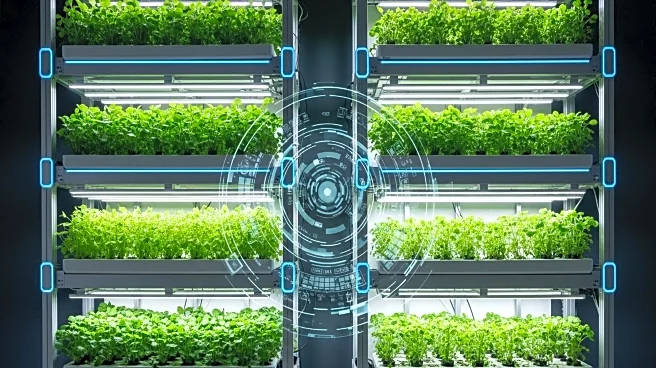What is the story about?
What's Happening?
The global vertical farming market is projected to experience significant growth, with a compound annual growth rate (CAGR) of 24.6% from 2024 to 2031. This expansion is driven by the need for sustainable food production systems due to shrinking arable land and resource depletion. Vertical farming utilizes stacked growth systems, hydroponics, and aeroponics to cultivate food in controlled environments, ensuring consistent yields with minimal resource consumption. The integration of Artificial Intelligence (AI) and Generative AI (GenAI) is transforming vertical farming by enhancing efficiency and automating operations. These technologies support precision agriculture, environmental control, and predictive crop optimization, making farming more profitable and ecologically sound.
Why It's Important?
The growth of the vertical farming market is crucial as it addresses the challenges posed by climate change and resource scarcity. Vertical farming offers a resilient alternative to traditional agriculture, providing consistent yields regardless of weather conditions. It significantly reduces water usage and eliminates the need for pesticides and chemical fertilizers, thus minimizing agriculture's environmental footprint. As urban centers strive for food self-sufficiency, AI-powered vertical farming is emerging as a cornerstone of next-generation food production strategies. This shift not only supports global sustainability goals but also enhances local food access and reduces dependency on imports.
What's Next?
The U.S. vertical farming market is expected to grow at a 19.5% CAGR between 2025 and 2030, driven by the integration of renewable energy sources. As solar and wind technologies become more economical, vertical farms are increasingly powered by clean energy, reducing operational costs and carbon footprints. This synergy between renewable energy and indoor farming is paving the way for scalable, climate-resilient agriculture in urban spaces. Additionally, the market is witnessing strong venture capital interest and rapid startup expansion, with companies leveraging AI integration and renewable energy solutions to create highly productive, low-input farms.
Beyond the Headlines
Vertical farming presents a sustainable solution to agriculture's intensive environmental impact, consuming significantly less water and eliminating the use of pesticides. This approach supports global sustainability goals, as irrigation currently accounts for a large portion of global freshwater use. The advancements in vertical farming practices offer a promising approach to securing food production while minimizing ecological impact. As urban populations grow and arable land becomes scarce, vertical farming could play a pivotal role in ensuring food security and sustainability.
















